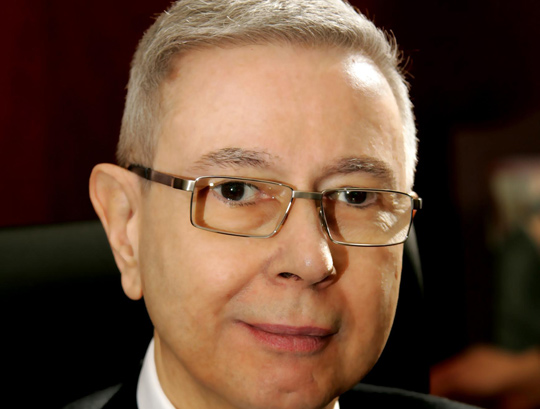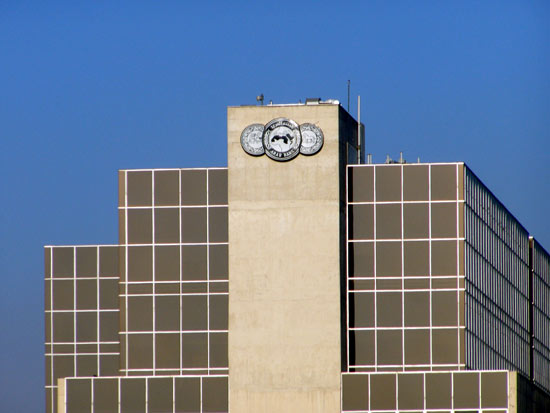Arab Bank Jordan
Standard & Poor’s Corp. cut Jordan’s long-term local currency sovereign ratings to BBB- from BBB.
Interview with Mr. Abdel Hamid Shoman, Chairman of Arab Bank

What is your overall assessment of Banking sector in Jordan and its outlook?
Standard & Poor’s Corp. cut Jordan’s long-term local currency sovereign ratings to BBB- from BBB.
Despite the minor drop in ratings, the Banking sector in Jordan is healthy as evident by the menu of monetary tools which includes regulatory measures that guard against systemic risks and ensure well-capitalized banking system with overall capital adequacy surpassing 18% as of 2009. Furthermore, banks in Jordan continued to enjoy an increasingly sound operating environment despite the fact that non-performing loans percentages increased from about 4% in 2008 to 6.4% in 2009. This increase is in line with banking experiences elsewhere.
Despite the minor drop in ratings, the Banking sector in Jordan is healthy
Do you feel that lending has been slowly resumed or the situation is virtually the same as last year?
The lending activity of banks remained essentially flat in 2009 which was a year of acute deleveraging across the world’s major banking systems; however the central bank’s interest rate cuts in February should encourage commercial banks to draw down the sizeable excess reserves they are holding.
During the downturn, real estate and construction centers have contracted and forced credit demand to regress as well. As expected, a slower economy dragged demand for credit relative to accumulating deposits and other banking products, ultimately affecting profitability. This trend persisted despite the deployment of quantitative easing policies that cut interest rates four times since the start of the global financial crisis.
The rest of 2010 seems to be a continuation of the situation last year.
How do you intend to compete with emerging regional players with appetite?
You have mentioned that a likely result of the economic downturn will be a more competitive banking system.
“In Jordan, we are the largest financial institution in terms of both assets, which totaled USD 50.6 billion in 2009, and market capitalization, accounting for around 57% of the banking sector’s market capitalizationon the Amman Stock Exchange (“ASE”) and almost 27% of the ASE’s total capitalization. We were the first public shareholding company to be listed on the ASE in 1978.”

What is important to mention is that we are a regional player and we have had presence in some Middle Eastern countries before they even had a central bank. We also have the world’s largest Arab banking branch network with over 500 branches in 30 countries across five continents. Our network and successful history gives us an edge over other banks.
In terms of growth strategy, we have mostly relied on organic growth, and continue to do so now. We are not actively seeking acquisitions at the present time, however, should the appropriate opportunity present itself at the right time and price, we would be interested in exploring it. Our core focus remains to be MENA, however.
Are you satisfied with the policies Jordan Ministry of Finance and Central Bank introduced or do you feel more could be done?
Jordan is undergoing the issuance soon of its first ever $300-500m sovereign Eurobond.
The country has succeeded in developing and applying sound monetary tools and regulatory policies, which played a proactive role in alleviating the fallouts. The fruitfulness of the existing suite of macro, monetary and regulatory policies is best illustrated by the fact that while many global banks collapsed and many others received direct capital injections from their governments, the number of collapsed banks in Jordan was zero and no Jordanian banks received direct capital injection.
How do you assess this result and what is your outlook for the second half of 2010?
Arab Bank Group’s net income before tax and after provisions for the six months ended 30 June 2010 amounts to $410 million, a drop of 9% from prior period. Also, total assets reached $48.9 billion, compared with $50.6 billion at the end of 2009 , due to the drop of some major currencies against the US dollar.”It is noteworthy that in recognition of its outstanding ranking in the banking sector, Fitch has in May 2010 affirmed Arab Bank’s rating of (A-) long-term with a Stable Outlook.
The Bank has also been recently reaffirmed by Standard and Poor’s with a rating of (A-) and by Moody’s with a rating of (A3). The affirmation of Arab Bank’s reflects the franchise value both locally and international, geographically diversified assets quality, in addition to the distinctive ratios maintained by the bank and in particular liquidity and capital adequacy.
The Bank has also been recently reaffirmed by Standard and Poor’s with a rating of (A-) and by Moody’s with a rating of (A3).
2009 was a difficult year, and 2010 seems to be a continuation of that. We expect flat revenues and controlled cost. Hopefully the economy and interest rate environment will pick up in 2011.
Can you give us a brief on the strategy of Arab Bank in Jordan and globally?
Arab Bank has an unmatched global Arab branch network with over 500 branches spanning five continents, and locations in key financial markets and centers such as London, New York, Dubai, Singapore, Zurich, Paris, Frankfurt, Sydney and Bahrain.
Our plans for 2010 and beyond will be developed whilst taking into consideration the prevailing and expected market conditions.
Though we expect the global economy to recover slowly, we expect to still be indirectly affected along with the world’s markets at large.
In terms of business growth, we plan to continue growing organically through expanding our branch network and increasing our capabilities in terms of products and services. Specifically, we will continue to carefully grow our retail business, which is still relatively new and makes up about 30% of our business and has a high potential for growth.
Geographically, our focus remains in the MENA region where we plan to further deepen our presence, as long as it fits our strategy and business model in the respective location.
We have been closely monitoring the evolving global and regional situation, regularly simulating their impact and taking the necessary measures to preserve our historical values and principles relating to: Liquidity, Capital Adequacy, Risk Management and Excellence through building upon and enhancing our customers’ satisfaction, our shareholders’ return, and operational efficiency.
What do these awards mean to you?
In June 2010, Arab Bank received the Euromoney Awards for Excellence 2010. Your family was recognized for your outstanding contribution to financial services in the Middle East and Arab Bank also received “The best bank in Jordan“ award.
In 2010 we have received many awards and recognitions and not just for the Bank as a whole, but its different services and products. We have received recognitions for our Saver Mortgage product which received the award of ‘Best Home Finance Product’ in the Middle East. We have also received the title of Best Retail Bank in Jordan from the Asian Banker and Best Consumer Internet Bank in Jordan from Global Finance.
It is an honor to receive these awards and to be recognized as it reflects all of our hard-work and efforts; not only in Jordan, but the Middle East as a whole. Our customers do have high standards and we are constantly working to provide them with the best services and products to better meet their needs
How do you think of Arab Bank in light of corporate social responsibility?
Giving back to the community through participating in various corporate and social responsibility activities is an integral goal of Arab Bank’s vision. Arab Bank considers that one of its salient roles is to create sustainable ways of support towards important initiatives by highlighting and providing simple ways of volunteering and contributing.
Arab Bank has historically been active in sponsoring educational, cultural and medical institutions through financial support for universities, schools, hospitals, youth centers and cultural centers as well as non-governmental organizations.
In 2009, Arab Bank launched the program ‘Together’ which is a large-scale corporate and social responsibility program that caters to both Arab Bank’s customers and its employees. This program enables contribution and volunteerism to support education, help orphans, alleviate poverty, enhance healthcare and protect the environment.
Arab Bank’s proactive role in social development can also be perceived through the various activities undertaken by the social and cultural arm of Arab Bank; the Abdul Hameed Shoman Foundation (AHSF). Arab Bank has always stood up to shoulder its social responsibility towards its host communities. It continues to actively sponsor educational, cultural and medical institutions through extending financial support to universities, schools, hospitals, youth and cultural centers, as well as NGO’s.